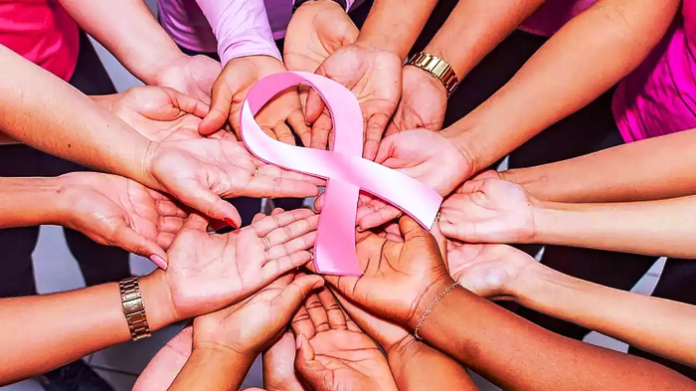Kochi, October 31, 2023 : Breast cancer tops the health charts as the most common kind of cancer found in women and in recent times its occurrences have only gone up. In this regard, doctors from Amrita Hospitals said that the number of breast cancer patients who fall under the age bracket of 20-40 years old, has increased.
During a Breast Cancer Awareness Month webinar, doctors from Amrita Hospitals stressed upon the significance of early detection and screening for preventing and treating breast cancer. Usually, 60% of cases are diagnosed at advanced stages, leading to a lower the cure rate. Nevertheless, regular check-ups can increase the cure rate to 80-90%. Experts advise initiating breast cancer screenings at age 20 with breast self-examination and if detected any abnormalities they take clinical breast evaluation and repeating them every three years. For those aged 50 and above, annual mammograms and regular self-examinations are recommended.
“Breast cancer tops the health charts as the most common kind of cancer found in women and in recent times its occurrences have only gone up. Recognizing the early warning signs of breast cancer is crucial for timely diagnosis and effective treatment. Be on the lookout for changes such as new lumps, alterations in breast texture, skin irregularities, nipple issues, bloody nipple discharge. It is important to remember that these symptoms can also be linked to non-cancerous conditions. So, when in doubt, seek professional guidance for early detection and peace of mind,” added Dr. Saphalta Baghmar, Senior Consultant, Medical Oncology, Amrita Hospital, Faridabad.
Dr. Shiveta Razdan, Consultant, Breast Oncology, Amrita Hospital, Faridabad, said, “A breast cancer diagnosis brings emotional turmoil and concerns about the future, but proper treatment can restore normalcy. Informed decision-making is crucial for surgical procedures, involving detailed discussions of options, potential complications, and recovery times. The choice of surgery depends on tumour size, number of tumours in the breast, stage of cancer, genetic factors, breast volume, overall health, and patient preferences. For larger tumours relative to breast size, systemic chemotherapy may precede breast conservation surgery. For small tumours with adequate breast volume, oncoplastic breast surgery can be offered using plastic surgery techniques to preserve the cosmesis. Tailoring treatments to individual cases ensure the best path towards recovery and a quality life.”
Experts have also highlighted that early detection is fundamental for breast cancer survival. Age-appropriate screenings are essential for maintaining breast health.
‘Various modalities for breast cancer detection are emerging. Early detection is crucial for improved cure and survival rates. When women express concerns about their breasts, prompt evaluation is necessary. For early teens and those in their 20s to 30s, ultrasound is the initial imaging choice, followed by mammography if needed. Women aged 30-40 can opt for ultrasound with mammography. Contrast-enhanced Mammography (CEM) is an advanced technology for early detection, especially in high-risk groups, even detecting sub-centimeter cancers. This technology is kind of problem solver, and even helps in staging and post chemotherapy response assessment. If anything is inconclusive in mammography, ultrasound and in CEM, we have the option to go with breast MRI,” added, Dr. Lekshmy R, Associate Professor, Radiology, Amrita Hospital, Kochi
Dr. Vijaykumar DK, Head of Breast and Gyno Oncology at Amrita Hospital, Kochi, highlighted the global challenges faced by medical experts while developing vaccine. He explained. “In the realm of cancer prevention, vaccines have shown effectiveness in combating diseases with a single, identifiable cause. However, with breast cancer, a complex challenge arises due to its multifactorial nature. Our primary focus in this research is to boost the body’s immune system, as a robust immune system can help reduce the risk of cancer development. While creating a direct vaccine for breast cancer may not be currently feasible, ongoing efforts aim to enhance immunity and reduce the risk of cancer.”
Dr. Pavithran K, Professor and HoD, Medical Oncology and Hematology, Amrita Hospital, Kochi, ” The true challenge lies in the impact of social stigma and self-stigma on women battling breast cancer. These factors, stemming from fears of body changes, discrimination, and misconceptions, can delay treatment and harm health. By raising awareness and creating safe spaces, we can help these women overcome stigma and access the care they need. Patient support groups serve as pillars of strength for those dealing with breast cancer, offering essential emotional, psychological, and practical assistance. Within these groups, individuals discover a community that embraces their experiences and emotions, providing a comforting and therapeutic outlet for sharing fears and anxieties, all without judgment. Creating an environment where people feel safe discussing breast cancer and seeking early detection is essential. By combining education, empathy, and support, individuals can be empowered to take charge of their health and well-being.”
Health experts advise embracing a heart-healthy lifestyle, focusing on nourishing foods and prioritizing daily physical activity over a sedentary lifestyle. They stress the significance of regular breast cancer screenings and self-examinations for early detection and effective management, with proactive screening recommended for individuals of all ages to safeguard their health.
Corporate Comm India (CCI Newswire)





















